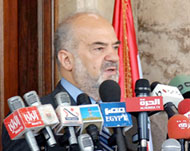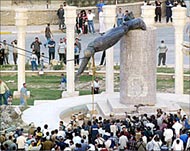Hope for end to Iraq deadlock
Iraq’s acting speaker of parliament says he will call on the assembly to convene in the next few days, raising the possibility that the political deadlock over a new prime minister could be broken.

“The Iraqi people are impatiently waiting for this issue to be resolved. When the parliament convenes it will be possible to start the steps to form a national unity government,” Adnan Pachachi told a news conference on Sunday.
His announcement was the first public sign of a possible step forward for Shia, Kurdish and Sunni leaders who are struggling to form a unity government they hope can avert sectarian civil war.
The United States and Britain have stepped up pressure on Iraqi leaders to form a government as soon as possible, stressing that the political vacuum would play into the hands of the Sunni Arab uprising and fuel sectarian bloodshed.
 |
|
There is growing pressure on |
But there are no signs that will happen soon as Iraqis contemplate their difficult plight three years after the fall of Baghdad.
Pachachi did not say whether the assembly would vote on a prime minister and there was no suggestion that Ibrahim al- Jaafari would finally agree to widespread calls for him to step aside as the main Shia Alliance’s nominee.
But some politicians believe taking the prime minister issue to parliament for a vote is the only way to break the impasse.
The problem is that al-Jaafari’s ruling Shia Alliance, which is already deeply divided, risks an internal crisis if it agrees to a vote in parliament.
Sources in the Kurdish Alliance said it had already rejected al-Jaafari’s nomination for the premier’s post.
Paralysis
The latest political manoeuvrings in Iraq came as Britain’s foreign secretary reiterated that the country had not yet descended into civil war, although he conceded there was a “high level of slaughter”.
 |
|
US troops rolled into Baghdad |
Jack Straw’s comments came in an interview on Sunday with BBC television, where he stressed his concern over Iraq’s political paralysis exactly three years after the fall of Baghdad.
“It’s very frustrating because the leaders are taking far too long to form this government which we’ve elected, well the parliament was elected, on December 15, almost four months ago,” he said.
His comments came after Hosni Mubarak, the Egyptian president, offered a grim assessment of Iraq, saying that civil war had started.
The Iraqi government, eager to project an image of unity, was quick to hit back.
“The comments have upset Iraqi people who come from different religious and ethnic backgrounds and has astonished and discontented the Iraqi government,” al-Jaafari said, flanked by Sunni, Shia and Kurdish leaders.
Jalal Talabani, the president, said the “accusations against our Shia brothers are baseless and we have asked our foreign minister to talk to Egypt about this”.
Mubarak said in his comments on Saturday, that Shia in Arab states were more loyal to Iran than their own countries, echoing accusations by Iraqi Sunnis about their own Shia leaders.
The comments came after three consecutive days of bombings on Shia targets killed about 100 people in Iraq.
Third anniversary
The raging violence highlighted the continuing instability facing Iraq on the third anniversary of the US capture of Baghdad, which was symbolised by the giant statue of Saddam Hussein being dragged down in Firdos (paradise) square.
These days the square is protected by blast walls.
“When I heard the Americans ripped down the statue of Saddam I was happy because I thought we were finished with his stupid wars,” said traffic policeman Ali Jabar, 34.
“But If I knew that I would lose my younger brother to a car bomb, I would have preferred to stay under Saddam’s rule.”